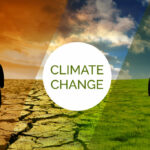By Abujah Racheal
Climate change and environmental degradation represent a great threat to poverty reduction and achieving the Sustainable Development Goals (SDGs).
Given their traditional roles in agricultural production, and as the procurers of water, cooking fuel, and other household resources, women are not only well suited to find solutions to prevent further degradation and adapt to the changing climate, they have vested interest in doing so.
Across the globe, agriculture is recognised as an important engine of growth and poverty reduction.
The sector which grew by 3.58 per cent, contributed 26.84 per cent to the overall GDP in real term in the fourth quarter of 2021, lower than the contribution in the fourth quarter of 2020 and third quarter of 2021 which stood at 26.95 per cent and 29.94 per cent respectively.
According to the Food and Agriculture Organisation (FAO), the sector is under-performing in many countries in part because women, who are often a crucial resource in agriculture and the rural economy, face constraints that reduce their productivity.
The productivity of crops and livestock is directly impacted by temperature, precipitation, water concentration, and extreme weather. In some of these contexts, women are mostly vulnerable to their effects primarily because they constitute the majority of the world’s poor and are more dependent for their livelihood on natural resources that are threatened by climate change.
Women constitute 60 per cent of the agricultural labour force, 80 per cent of food producers and 50 per cent of animal husbandry and other related activities in Nigeria.
Despite this population, they have poor access to information on climate change mitigation, especially on good farming practices, seasonality, data on yields, soil health, and weather patterns.
Also, small holders’ women farmers are often confined to traditional tools, which in most cases prolong working hours and reduce productivity. This makes them more vulnerable to the impact of climate change.
The 2022 allocation to Women’s Economic Empowerment (WEE) projects, however, recorded 101 per cent increase (N103 billion) compared to the 2021 (N51.3 billion) budget.
This implies that less than one per cent of the 2022 budget was allocated to WEE programmes in a year that the Nigerian President, Muhammadu Buhari, promised “gender-responsive budgeting”.
An analysis of the 2022 budget by the Development Research and Project Centre (DRPC), shows that the N103 billion allocated to WEE projects constitute 0.60 per cent of the budget.
It identified four basic elements: Human Capital (education, skill and training), Financial Capital (loan, grants, saving), Social Capital (mentorship, network, etc.) and Physical Capital (land, machinery, etc.), which are parameters, the DRPC considers necessary preconditions for sustainable economic and social development.
According to FAO, it is estimated that roughly 30–40 per cent of all food produced is lost between harvest and consumption. In underdeveloped countries, about 40 per cent is lost on farm or during distribution due to poor storage and distribution.
On the other hand, the increasing role that rural women are playing in smallholder agriculture provides an important opportunity to positively impact food production and security in a changing climate.
Women farmers said that they are experiencing changes in rainfall duration and intensity, more erratic rainfall patterns and more prolonged droughts.
As a result, they said it is increasingly difficult to plan and make agricultural decisions. They associate the emergence of new crop diseases and pests with climate change.
They also said that the changes in agricultural practices in villages are lower incomes, less household food availability, less access to resources for improved agricultural production and, on the positive side, more opportunities for training.
Mrs Maimuna Abdullahi, Health Economist, said that climate change affects everything from geopolitics to economies to migration, and shapes cities and life expectancies.
Abdullahi, who is also the Head of Monitoring and Evaluation, African Health Budget Network (AHBN), said if Nigeria wants to see its economy prosper, it must enact the domestic policy and structural reforms that would empower women and MSMEs.
“Flexing what has been an under utilised muscle will enable us to realise new and measurable gains – including a credible response to the concerns around growing wealth inequality,” she said.
She said that the empowerment of Nigerian women in the economy and closing the gender gaps in the country are keys to achieving the 2030 Agenda for SDGs.
“More than budgetary allocation which is needed, is the use of what is allocated transparently with accountability, using what is allocated for intended purpose and networking with other players and stakeholders to avoid duplication of efforts,” she said.
Dr Edwin Isotu Edeh, Public Health and Environment (PHE) Programme Coordinator, World Health Organisation (WHO) in Nigeria, said that climate change is driving health inequities and conflicts across the world, with women and girls facing increased vulnerabilities to all forms of gender-based violence, including conflict-related sexual violence and human trafficking.
Edeh said that it is, therefore, imperative to push for increased financing for programmes and women-focused initiatives, especially in rural communities and fragile settings to address climate concerns in the country.
“Changes in ozone, greenhouse gases and climate change affect agricultural producers greatly because agriculture and fisheries depend on specific climate conditions,” he said.
According to Mrs Talibat Hussain, Senior advisor on gender and livelihood on the DRPC-PAWED project, “as the compelling reality of climate change sets in, there is the need for government at all levels to provide irrigation facilities and equipment to women farmers to mitigate the impact of drought”.
Hussain said that there is also the need to promote the use of alternative energy sources such as biofuel to curb the deforestation and the need for government to carry out gender-specific in-depth evidence-based research on climate change.
She said that there was need for government to redeem the pledged to reduce Nigeria greenhouse gas emissions by 20 per cent by 2030 in line with the Paris Agreement ratified in 2017.
According to her, effective implementation of the National Climate Change Policy for Nigeria 2021-2030 as well as the National Action Plan on Gender and Climate Change for Nigeria 2020-2025 will go a long way to mitigating the effect of climate change on women.
(NANfeatures)

 Join Daily Trust WhatsApp Community For Quick Access To News and Happenings Around You.
Join Daily Trust WhatsApp Community For Quick Access To News and Happenings Around You.


